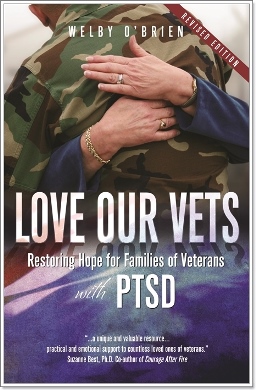August 22, 2013 Welby O’Brien
Do you have any idea that the one you tearfully bid farewell may never be in your arms again — at least not like you remember them? If your servicemember has experienced any level of combat, he or she could come home wounded in a way you can’t see – with post traumatic stress (PTS) or even post traumatic stress disorder (PTSD).
You’ve probably heard of PTSD before, but did you know anyone who has been through a very stressful event from something as normal as a car wreck to something as intense as combat likely feels some level of PTS? The difference between the two is in how it impacts your life. It’s normal to feel a bit jumpy about driving down the freeway if the last time you did it you were hit. But when that jumpy feeling starts interrupting your normal day or even your night, you may be dealing with an entirely different beast – PTSD.
Your servicemember is no different. When someone experiences combat he or she will probably feel the impact of that stress afterwards. But when that stress morphs into something that takes over their life or is uncontrollable, you’ll need to get help.
Are you prepared?
You probably think right now that this lady is crazy and none of this applies to you or your warrior. This kind of stuff only happens to other people. Particularly if your servicemember has seen combat, you may join the world of other people. And wouldn’t it better to be ready for it?
The good news is that there is hope. I know because my veteran and I are living it every day. But there was a time when we both were ready to throw in the towel. We thought we just couldn’t do it anymore. But now looking back we are so glad we stuck it out. We both got help. And today neither of us would trade each other for the world, even with the PTSD.
Here are 3 things that have helped me and many others to be best prepared for the wonderful homecoming of our heroes and to increase the odds of a fulfilling relationship in spite of the possibility of PTSD.
1. Learn all that you can about PTSD — now. I had never heard of it when I met my husband. (PTSD…what is that, a radio station?) If your warrior has been exposed to potentially traumatic events, it may be helpful to educate yourself about what you could be dealing with. I found a helpful class through the Department of Veterans Affairs for families and spouses, and you can go here to see what your local Vet Centers have to offer. I also read all I could get at online. I learned what to look for, such as nightmares, flashbacks, hyper-vigilance, outbursts of rage, anxiety, substance abuse, withdrawal (they just seem like they aren’t there), or even suicidal thoughts. You’ll also find where to go for help. Another good place to check out is the Coaching into Care programs through the VA.
2. Connect with others who are living successfully with it. Be prepared to meet for coffee with another spouse, or connect with other spouses on Facebook pages such as Love Our Vets PTSD Family Support. Knowing where to find others who are going through the same thing will make you feel so relieved that you are not alone. You are not crazy, and neither is your spouse. People share openly about their struggles, and also what helps them.
3. Know how to take good care of you and your needs. How many visits to the doctor I wasted trying to fix what I thought were imbalanced hormones! Several meltdowns and a broken foot later (don’t ask), I starting paying attention to my needs and issues. I am still trying to remember that it is not all about taking care of him, and that I also need to take care of me. When I do that we both benefit.
If you take time to put these three things in place as precautions before your warrior comes home, your chances of happily-ever-after will be so much greater.
Welby O’Brien is crazy about her veteran husband, who has PTSD. She founded the spouse/family support network Love Our Vets PTSD Family Support, and wrote the book LOVE OUR VETS: Restoring Hope for Families of Veterans with PTSD. Although she has a master’s degree in counseling, most of what she shares comes just from daily life. For more info on PTSD and family support, visit her website www.LoveOurVets.org
http://spousebuzz.com/blog/2013/08/why-you-should-be-prepared-for-ptsd.html#ixzz2d27fAGQu

